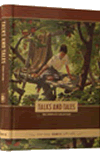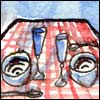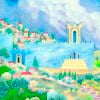Rabbi Joseph ibn Migash was fortunate to be born into one of the noblest Jewish families of Spain. His grandfather, also called Rabbi Joseph, had played an important role at the royal court of Granada, as one of the associates of Rabbi Shmuel Hanagid. Yet the same political catastrophe that befell this great man's son, Rabbi Joseph Hanagid, drove Rabbi Joseph away from the court of Granada to Seville, where he was soon again one of the favorites of the Caliph.
Rabbi Joseph's father, Rabbi Meir ibn Migash, was a man of great knowledge and influence among his Jewish and non-Jewish community members. The young Joseph was therefore brought up with all the care and the education possible in those days. He was only a youngster when his great rabbi, Rabbi Yitzchok ben Boruch Al Fazi, recognized the extraordinary gifts of the child and influenced his illustrious father that he encourage him to concentrate exclusively upon the study of Torah, promising that his son would accomplish great things. Rabbi Meir ilm Migash, himself a Talmud scholar, lent a willing ear to this suggestion of his son's teacher, and he sent Joseph, then hardly fourteen years old, to Lucena, in the year 1091, where the scholar of the time, Rabbi Yitzchok al Fazi (RIF), headed the Talmudical Academy. This famous scholar was the first one to extract the Halachoth (law decisions) from the discussion of the Talmud, in the monumental work, known after his name, as the "Rif." He was also the fully recognized head and supreme authority on all questions of Jewish law for the Jewish centers of the world. In his Yeshivah studied the future "fights" of Israel. Rabbi Yitzchok befriended the young child as if he were his own son, and gave him everything he had and knew. Fourteen years, day and night, the two studied together.
When the Rif felt that the end of his days had come, at the ripe age of ninety years, he did not appoint any of the older scholars, nor his own worthy son Jacob as his successor, but the twenty-six year old Rabbi Joseph ben Meir of Seville. In the message to the Jewish world be acclaimed his young disciple as 11 a scholar who would have been outstanding even in the days of Moshe Rabbeinu." As was to be expected, the wide world did not know too much about the young man and thought his appointment improper for such an eminent position, previously held by his great master. Yet, within a short time the young scholar was able to gain the deep respect and world-wide recognition of the Jewish community leaders, and he was officially instituted as the successor to Rabbi Yitzchok Alfazi, as the head of the academy of Lucena, and with it, as the supreme authority of the Jewish world. Rabbi Yehuda Halevi, the greatest Jewish poet, who had already written a poem in honor of Rabbi Joseph's wedding, exclaimed on that day: "Today the hand of truth remained victorious, and justice stood by his side. . . . G‑d Himself in His Divine decision selected you."
The great confidence which the holy Rif had in his disciple was fully justified. Lucena became the center of Talmud study; and the Jewish communities of Europe, as well as of Babylon and Egypt, called upon Rabbi Joseph ibn Migash to decide their religious and communal problems. The young scholar was indeed fully grown to such an immense task, as we can see from Yehuda Halevi's line: "The searchers for Torah wandered from city to city to learn the law. . . . Go to Joseph, said a Divine voice; He shall tell you the proper way." Among the thousands of students who followed this call was Rabbi Maimun, -the father of the famous Rabbi Moshe ben Maimun, the holy Rambam. He became one of the great disciples of Rabbi Joseph, and long after he had left Spain to live in Egypt, he was an ardent admirer of his teacher. He imbued his own son with this respect and admiration for the work of Rabbi Joseph ibn Migash, who speaks of him with the greatest possible reverence: "The Talmudical learning of the man amazes everyone who understands his words and the depth of his profound spirit. His equal has perhaps never existed."
Besides teaching many generations of future scholars, and besides responding to thousands upon thousands of questions about the interpretation of, the Jewish law, Rabbi Joseph ben Meir wrote a commentary on the Talmud. Unfortunately most of the manuscripts were lost during the centuries of turmoil and persecution in Spain. However, the commentary on two Mesichtoth (the tractates Baba Bathra and to Shavuoth) that have been preserved, show how great is the loss of the missing work. For they are full of the deepest knowledge, which is almost encyclopedic, of the various sources and development of the Halachah. He always tries to enter ever deeper into the meaning of the various opinions of the Tanaim and Amoraim, and bases his own decisions upon the most reliable sources. Many of the Halachoth of the "RI Migash" are contained in the "Pe'er Hador" of the Rambam, in the "Baal Hama'or" of the eminent young scholar Rabbi Zerachya Halevi of Gerona, and in the famous collection "Shitah Mekubetzeth" of Rabbi Betzalel Ashkenazi. All of these fragments of the monumental spiritual work of Rabbi Joseph ibn Migash give evidence ' of his amazing scholarship. Yet at the same time they bear the earmarks of his modesty and respect for the opinions of other people.
Rabbi Joseph ben Meir ibn Migash concentrated entirely on the study of the Talmud, to which he devoted his life's work. His only other interest lay in composing "Piyutim," poetic prayers, glorifying G‑d and His work, or pointing out the importance and historical role of the various Jewish holidays for which they were written.
When Rabbi Joseph ben Meir ibn Migash died (on the 30th day of Nissan, 4901) at the age of sixty-four years, there was no one to step into his eminent place. The center of Talmudical study moved from Spain northward to France and Germany, where Rashi and his successors created their master works of Talmudic scholarship.







Start a Discussion